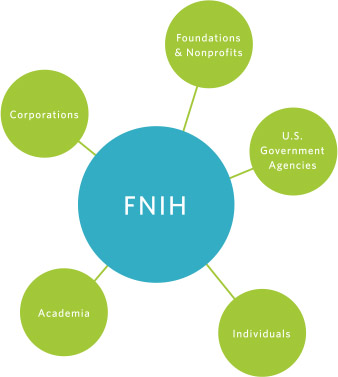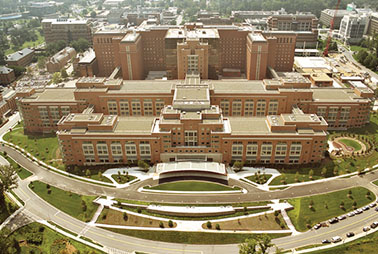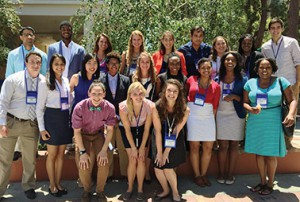The power of our
organizational structure.
The Foundation for the National Institutes of Health (FNIH) was founded in 1996 by an act of Congress as a 501(c)(3) not-for-profit that can raise private funds in support of the NIH mission. In addition to raising funds—more than $830 million since our founding—the FNIH has excelled at creating innovative cross-sector partnerships in a neutral, pre-competitive environment to tackle large biomedical challenges with great urgency and efficiency. These partnerships offer a new way of generating the discoveries that improve health and change people’s lives for the better. For 10 years, Charity Navigator has rated FNIH as an organization that exceeds industry standards and performs as well or better than most charities.
Since its establishment nearly two decades ago, the Foundation for the National Institutes of Health (FNIH) has become a leader in forging powerful public-private partnerships that advance biomedical science. With the careful crafting and execution of cutting-edge initiatives, such as the Grand Challenges in Global Health and the Accelerating Medicines Partnership, the FNIH helps the National Institutes of Health (NIH) turn discovery into improved health.
As with many sectors, the need for collaboration in biomedical research is a necessity and requires expertise and years of experience. Many partnerships fail due to an inability to identify the right people, meet expectations and guide the team to measurable results. This leads to missed opportunities for groundbreaking contributions to science.
The FNIH is a proven catalyst for meaningful collaboration that produces results. To begin, the FNIH convenes the right people to develop solutions to a variety of health-related problems. The FNIH draws upon expertise from academia, industry, federal agencies and not-for-profit organizations to address problems together, rather than working individually.
Facilitating collaboration with proven, flexible management and funding models that promote innovation, the FNIH fosters consensus and leads large-scale projects that succeed with transformative results. For example, the Biomarkers Consortium’s I SPY-2 project created a new landscape for clinical trials, using precision medicine to allow multiple breast cancer treatments to be tested at the same time in a single trial. It also introduced new adaptive designs to cancer trials and helped establish an accelerated approval pathway for new breast cancer medicines. Many FNIH programs have shown that these results are greater than what could be achieved by one organization and are meaningful for the entire biomedical community.
The FNIH’s success has resulted in a robust programmatic portfolio. As evidenced in this report, the portfolio includes work to identify predictive biomarkers that correlate with knee osteoarthritis progression and better inform treatments, to support clinical research to prevent age-related cognitive decline and to build the infrastructure needed in Mali to further bioinformatics research. Additionally, the FNIH continues work to raise funds for training the next generation of young scientists and to provide free lodging for NIH Clinical Center patients and their families through the Edmond J. Safra Family Lodge.
The future of biomedical innovation relies upon a collaborative approach to tackle the world’s most pressing health challenges. Looking ahead, the FNIH is well-positioned to continue building these essential partnerships that may lead to scientific breakthroughs and improve public health for generations to come.
 Charles A. Sanders, M.D.
Charles A. Sanders, M.D.Chairman
 Maria C. Freire, Ph.D.
Maria C. Freire, Ph.D.President and executive director




















